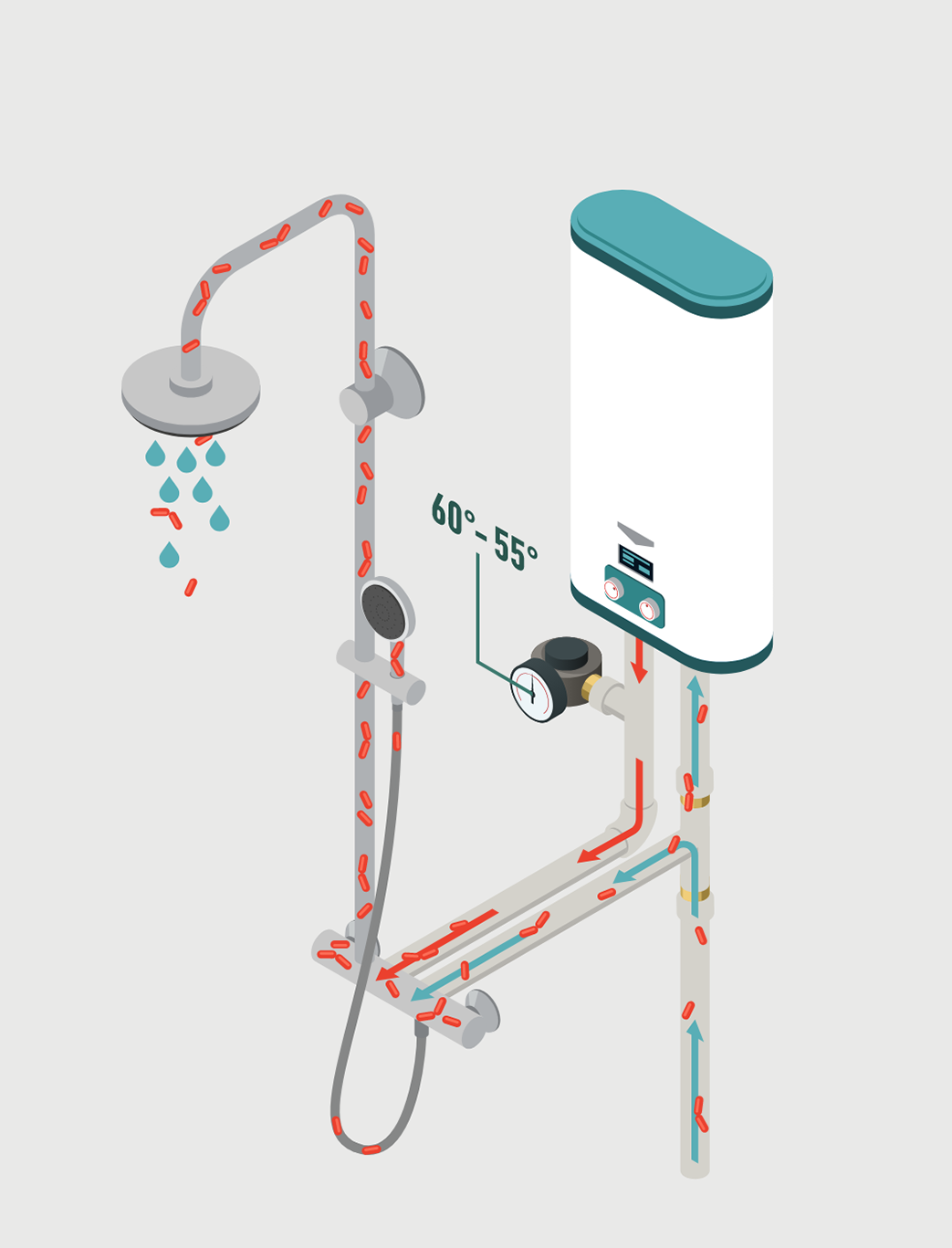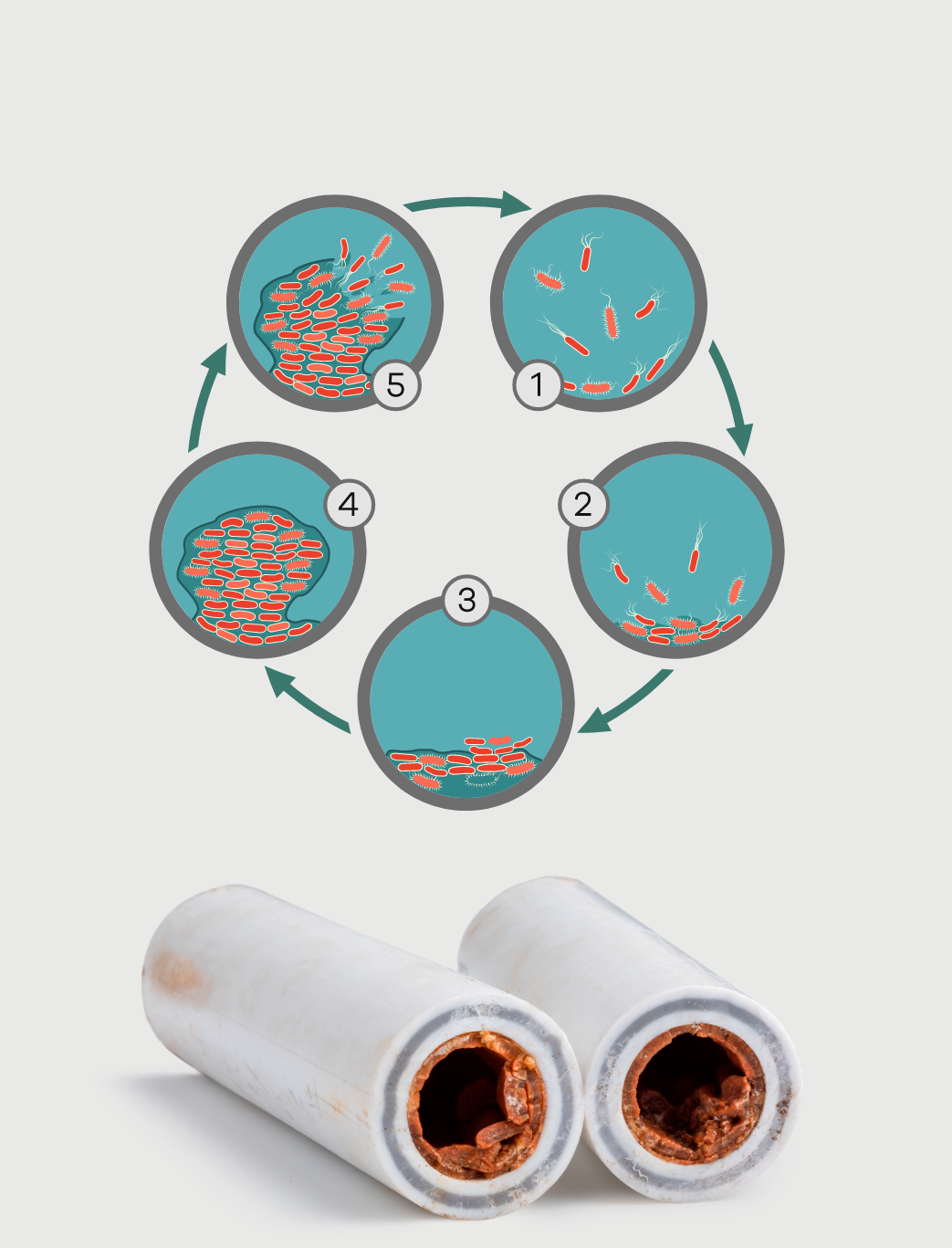Environmentally friendly disinfection against Legionella - which meets EU requirements
In recent years, the EU’s requirements for property owners to prevent the spread of Legionella have been tightened, and today every property owner must act preventively against bacterial attacks to meet the requirements. It is therefore no longer enough to simply check the hot water temperature and then act reactively in the event of a confirmed Legionella outbreak. Anolytech’s unique system acts preventively by continuously adding small doses of the environmentally friendly disinfectant AnoDes to the water. By installing Anolytech’s system in the property, both bacteria-free water and compliance with EU regulations are guaranteed.
Bacteria-free and safe water systems
Being able to guarantee that the water supply is bacteria-free is a fundamental requirement in a property housing any kind of healthcare facility. Patients, users and staff should be able to feel confident that the water in the property is safe to drink and use without potentially ingesting harmful and unhealthy bacteria. That being said, this is no guarantee that the water cannot become contaminated inside the property and spread harmful infection in kitchens, bathrooms and shower environments, even if the incoming water is of high quality.
Legionella bacteria can cause infections such as Legionnaires’ disease, a serious form of pneumonia. Bacteria are spread to the lungs by droplets of water that are inhaled via shower heads, hot tubs, tap aerators and similar.
The environmentally friendly Anolytech system continuously disinfects the water as a preventive measure, thereby creating peace of mind for people in all residential environments where water is used.
Tougher EU rules on Legionella
WHO has classified Europe as a problem area for Legionella, which has persuaded the EU to tighten up the rules concerning the control and prevention of bacteria.
To meet the previous requirements in the rules, all property owners had to do was perform their own regular checks. However, these checks were not performed frequently enough in many case, and measures were not implemented in time as a consequence. Regularly checking the water temperature in water heaters/HWC systems is no longer sufficient purely in terms of legal compliance.
Today, property owners are required to take appropriate steps to prevent outbreaks of infection in general, and predetermined plans are in place to implement measures in the event of infection outbreak. These stricter rules are part of the new Drinking Water Directive, together with the EU Right2Water.
Difficult and costly to remedy
Legionella bacteria can enter both cold and hot water pipes, regardless of the age of the water system. And water systems can still harbour Legionella even if the water heater/HWC system is heated to over 70 degrees Celsius.
Flushing the system with hot water is not sufficient either, as this fails to eliminate bacteria at end points in the system, such as shower hoses, shower heads and taps. If the water system also has problems with biofilm, this creates an environment in which bacteria flourish and can spread to the surrounding water.
A Legionella outbreak often has serious consequences for companies located and people living in the building. The constant presence of AnoDes in the water system radically reduces these risks and makes it simpler to perform quality assurance of the water.
The presence of AnoDes also means there will be far less need to replace shower heads and shower hoses as frequently as before.


Become self-sufficient for hand sanitizer and surface disinfection
As AnoDes is produced on site at your property, you can produce your own hand sanitiser by bottling AnoDes.
AnoDes is approved for hand sanitising in medical and care settings in accordance with EN 1500 (same as alcohol-based products) but is even better for hands as it does not try out skin like alcohol-based sanitisers do.
Producing your own AnoDes on-site is also cost-effective and environmentally friendly, and saves large quantities of water, as every litre of industrially produced sanitiser requires around 2,800 litres of water to manufacture. AnoDes uses just 1.5 litres, thereby helping to contribute to the sustainable water use goal of the UN’s 2030 Agenda. AnoDes can even be used to disinfect walls, work surfaces, loose objects, patient aids and tools.
Save water and energy
With an Anolytech preventive system, you no longer need to take reactive action to try to eliminate bacteria by flushing pipes and pipework, which saves large amounts of water. The system also delivers substantial energy savings. As Anolytech’s system does not require high temperatures to kill bacteria, the temperature in the hot water system can be lowered by 5 to 10 degrees Celsius, with associated significant energy and cost savings. Reducing energy consumption makes properties more sustainable and able to meet official requirements to reduce energy usage in line with the Sustainable Development Goals of Agenda 2030.
Effective against bacteria and biofilm
The unique Anolytech system ensures water is bacteria-free by continuously releasing antimicrobial AnoDes into the water pipes. Even in small doses, AnoDes kills bacteria, viruses, spores, mould and fungi effectively and stops the growth of biofilm that otherwise risks forming in the water system and providing a fertile environment in which bacteria can thrive.
And as AnoDes is produced using nothing more than water, salt and electricity, it does not contain any hazardous chemicals. This means AnoDes is both environmentally friendly and totally harmless to humans. Moreover, AnoDes does not affect the taste or odour of the water.
AnoDes is produced on site directly in a system that you rent from Anolytech. This is installed on site and connects to the water supply in the building.
Anolytech and AnoDes comply with Swedish National Food Agency regulations (2001:30) on drinking water, as well as EU drinking water regulations.
Preventive protection and long-term effectiveness
The Anolytech system differs from traditional methods where disinfection takes place only after problems have arisen and pipes and other parts of the system have to be replaced or flushed clean, often using harmful chemicals. Such initiatives eliminate the symptoms at the time, but they fail to resolve the fundamental problem; that bacteria can enter and disperse in the water system at any time.
With an Anolytech system, the problem is eliminated entirely as small quantities of AnoDes are a constant presence in the water pipes, killing bacteria. AnoDes also acts as a protective barrier if the incoming water were to be temporarily contaminated. AnoDes then provides preventive protection so that bacteria are unable to grow.
We can test for the presence of Legionella in the pipes in the property before installing the system. Once Anolytech’s system is installed, AnoDes will kill all the bacteria in the water system.
- There can be 700 - 800 different types of bacteria in the drinking water in a stable environment. Often, regular water samples measure only a few of these. Anolytech's AnoDes kills all types of bacteria effectively.
- The bactericidal effect of concentrated AnoDes is 200 times higher than that of chlorine.
- Among other things, AnoDes attacks proteins in the cell membranes of bacteria and other harmful microorganisms so that the cell ruptures and dies.
- Periodic disinfection efforts can be both expensive and difficult to implement as the animals need to be moved. With AnoDes, the disinfection takes place continuously with the animals in place.
- When AnoDes is consumed, it returns to its constituents: 99.5% water and 0.5% biodegradable substances. This makes AnoDes completely risk-free for both animals and nature. Bacteria that are multi-resistant to antibiotics are not a problem as AnoDes kills them as effectively as other bacteria.
Legionella in cold water
+
biofilm in pipes
+








